外研版高中英语必修4_module_5_课文(精)
外研版高中英语必修4 module 5 课文翻译(带要点)
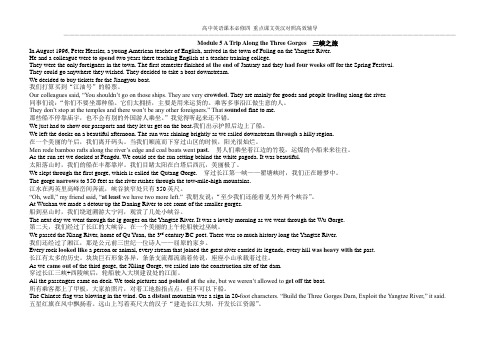
高中英语课本必修四重点课文英汉对照高效辅导—————————————————————————————————————————————————————————————————————————Module 5 A Trip Along the Three Gorges 三峡之旅In August 1996, Peter Hessler, a young American teacher of English, arrived in the town of Fuling on the Yangtze River.He and a colleague were to spend two years there teaching English at a teacher training college.They were the only foreigners in the town. The first semester finished at the end of January and they had four weeks off f or the Spring Festival.They could go anywhere they wished. They decided to take a boat downstream.We decided to buy tickets for the Jiangyou boat.我们打算买到“江油号”的船票。
Our colleagues said, “You shouldn’t go on those ships. They are very crowded. They are mainly for goods and people trading along the river.同事们说:“你们不要坐那种船。
它们太拥挤,主要是用来运货的。
乘客多事沿江做生意的人。
外研版高一英语必修4_Module5_单元背景探索阅读
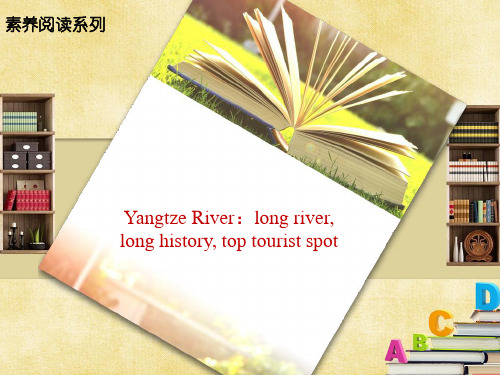
练有所得
1
1.Which is not right information about the Yangtze?
答
A.It is about 6300 kilometers long.
案
解
B.Ifs the longest river in the world.
析
C.It’s the third longest river in the world.
D.It flows west to east from the Qinghai-Tibet plateau.
练有所得
2
2.Why is the Yangtze a top tourist attraction in China?
答
案
A.It has many the historical and culturaMECCA(众人向往之地) The Yangtze is a top tourist attraction in China, and boats offer mostly four-or fiveday trips to and from the city of Chongqing. Slow-sailing cruise boats offer spectacular views and short stops at historical and cultural sites, such as the worldfamous Three Gorges Dam and the more mysterious Fengdu Ghost Town, which got its reputation from a local folk tale. Tourists can also walk in an ancient city called Jingzhou with city walls and battlefields described in the Chinese literary classic “Romance of the Three Kingdoms.” Further west on the upper reaches of the Yangtze is the scenic canyon Tiger Leaping Gorge, which ranks among the deepest gorges in the world. It get its name from a legend in which a tiger leaped across the fierce waters where the canyon narrows to escape being caught.② THREE GORGES DAM The river’s best-known attraction abroad is the world’s largest hydroelectric project, the Three Gorges Dam, built to control flooding along a stretch of the river in Hubei Province. The dam started operating in 2003 after nine years of construction.
【单词精讲】外研版高一英语必修4_Module5_trade

常用短语
trade off(v.+adv.) 〈非正〉交换物品或人 exchange one thing or people for another ▲trade sb/sth⇔off The two armies agreed to trade off their prisoners.两军同意交换俘虏。 They traded off horses hundreds of miles from home.他们到离家几百里外的地方用马匹换别的东 西。
This town carries on a brisk trade.这市镇贸易很昌盛。 Foreign trade kept the country's economy healthy.对外贸易使国家的经济健康发 展。
By the end of a year the little seed and grain shop had developed its trade considerably.到年底,那个种子、粮食小店的生意有了相当大的发展。 He is in trade.他经商。 None are genuine unless bearing the above trademark.无此商标者均系伪造。 He got a job as editor of a trade journal.他找到了一份当商业杂志编辑的工作。 Wu Yi Mountain City earns most of its income from the tourist trade.武夷山市的大 部分收入来自旅游业。 Words are the tools of her trade.言语是她那一行必不可少的工具。 He is a jack of all trades and master of none.他样样都懂一点,但都不精通。
外研版高中英语课文文本 必修一 Module 5 m5-Listening and Writing
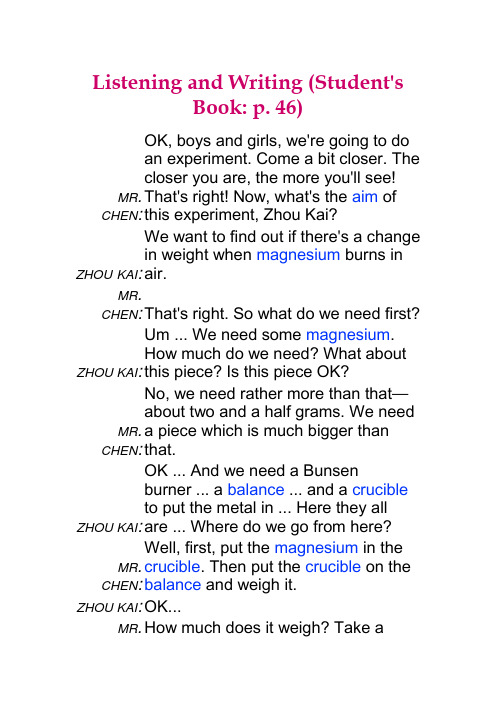
Listening and Writing (Student'sBook: p. 46)MR . CHEN : OK, boys and girls, we're going to do an experiment. Come a bit closer. The closer you are, the more you'll see! That's right! Now, what's the aim of this experiment, Zhou Kai?ZHOU KAI : We want to find out if there's a change in weight when magnesium burns in air.MR .CHEN : That's right. So what do we need first?ZHOU KAI : Um ... We need some magnesium . How much do we need? What about this piece? Is this piece OK?MR . CHEN : No, we need rather more than that —about two and a half grams. We need a piece which is much bigger than that.ZHOU KAI : OK ... And we need a Bunsenburner ... a balance ... and a crucible to put the metal in ... Here they all are ... Where do we go from here?MR . CHEN : Well, first, put the magnesium in the crucible . Then put the crucible on the balance and weigh it.ZHOU KAI : OK...MR . How much does it weigh? Take aCHEN : look, everyone. Is it any heavier?ZHOU KAI : Um ... It weighs two and a half grams.Do you want me to write that down?MR .CHEN : Yes, write it down. What next?ZHOU KAI : Yes ... Um, next, we're going to heat the magnesium . So I light the Bunsen burner. After that, I hold the crucible over it ... Oh look, it's burning with a white light! It's getting brighter andbrighter!MR . CHEN : It's pretty , isn't it? Keep the noise down, boys and girls, please.ZHOU KAI : Um ... lastly, we need to weigh the magnesium again ... It weighs fourgrams now.MR .CHEN : So what does that tell you? ZHOU KAI : It weighs a little more than before.MR .CHEN : How much more?ZHOU KAI : 1.5 grams more.MR .CHEN : And what does that mean?ZHOU KAI : It means that there is a change inweight when magnesium burns in air.MR . CHEN : You've got it! Well done! So now, let's do the same experiment with copper . Come along, Li Kang, it's your turnnow. What do you think will happen if you heat copper ?LI KANG : I think it'll be a lot heavier than magnesium . Shall I begin?MR .CHEN : Yes, go ahead!。
外研版高中英语必修五课件:Module 5 The Great Sports Personality
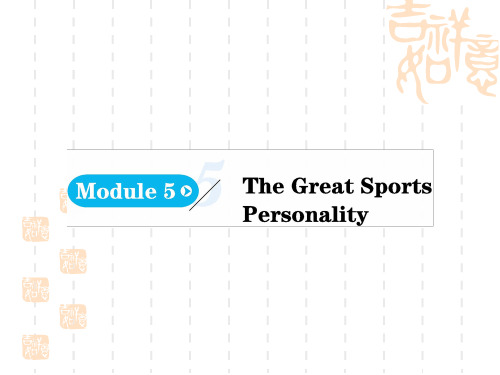
In 1989, he started the “Li-Ning” sports product brand.Sticking to the spirit of “from sports and to sports”, Li Ning has been supporting the sports causes at home and abroad.He often tells his employees, “Becoming a world champion is everybody’s dream.I have realized it.While it is my dream to become a successful entrepreneur.It depends on everyone of you.”
句式仿写
1.我不知道他什么时候来。(根据美句 1,同位语从句)
I have no idea
.
2.直到她摘下墨镜我才认出她是一位著名的电影明星。(根据美
句 2,强调句)
that I realized she was a famous
film star.
【答案】1.when he will come 2.It was not until she took off her dark glasses
Li was admitted into the International Gymnastics Hall of Fame in 2000, becoming the first Chinese member.
高中英语外研版必修五教师用书Module 4 Carnival
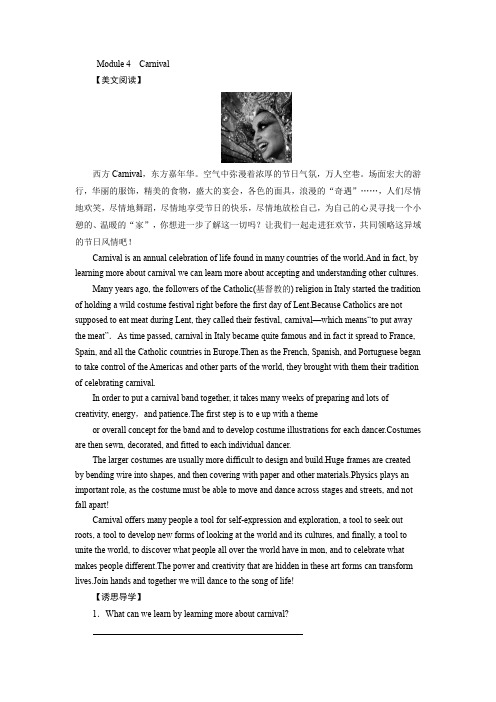
Module 4Carnival【美文阅读】西方Carnival,东方嘉年华。
空气中弥漫着浓厚的节日气氛,万人空巷。
场面宏大的游行,华丽的服饰,精美的食物,盛大的宴会,各色的面具,浪漫的“奇遇”……,人们尽情地欢笑,尽情地舞蹈,尽情地享受节日的快乐,尽情地放松自己,为自己的心灵寻找一个小憩的、温暖的“家”,你想进一步了解这一切吗?让我们一起走进狂欢节,共同领略这异域的节日风情吧!Carnival is an annual celebration of life found in many countries of the world.And in fact, by learning more about carnival we can learn more about accepting and understanding other cultures.Many years ago, the followers of the Catholic(基督教的) religion in Italy started the tradition of holding a wild costume festival right before the first day of Lent.Because Catholics are not supposed to eat meat during Lent, they called their festival, carnival—which means“to put away the meat”.As time passed, carnival in Italy became quite famous and in fact it spread to France, Spain, and all the Catholic countries in Europe.Then as the French, Spanish, and Portuguese began to take control of the Americas and other parts of the world, they brought with them their tradition of celebrating carnival.In order to put a carnival band together, it takes many weeks of preparing and lots of creativity, energy,and patience.The first step is to e up with a themeor overall concept for the band and to develop costume illustrations for each dancer.Costumes are then sewn, decorated, and fitted to each individual dancer.The larger costumes are usually more difficult to design and build.Huge frames are created by bending wire into shapes, and then covering with paper and other materials.Physics plays an important role, as the costume must be able to move and dance across stages and streets, and not fall apart!Carnival offers many people a tool for self-expression and exploration, a tool to seek out roots, a tool to develop new forms of looking at the world and its cultures, and finally, a tool to unite the world, to discover what people all over the world have in mon, and to celebrate what makes people different.The power and creativity that are hidden in these art forms can transform lives.Join hands and together we will dance to the song of life!【诱思导学】1.What can we learn by learning more about carnival?【答案】We can learn more about accepting and understanding other cultures.2.Which countries played an important rale in spreading carnival?【答案】Frence,Spain, and Portugal3.What does carnival offer people?【答案】Carnival offers many people a tool to develop new forms of looking at the world and its cultures.Period ⅠPreviewing(教师用书独具)●课标技能要求初步掌握本课文中的词汇,浅层次理解课文,了解相关的背景知识。
高一英语必修4(外研版)5-1 Introduction
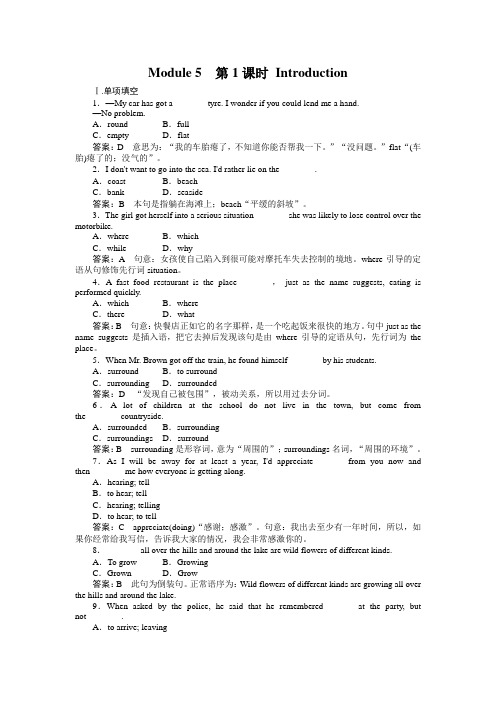
Module 5 第1课时IntroductionⅠ.单项填空1.—My car has got a________tyre. I wonder if you could lend me a hand.—No problem.A.round B.fullC.empty D.flat答案:D意思为:“我的车胎瘪了,不知道你能否帮我一下。
”“没问题。
”flat“(车胎)瘪了的;没气的”。
2.I don't want to go into the sea. I'd rather lie on the________.A.coast B.beachC.bank D.seaside答案:B本句是指躺在海滩上;beach“平缓的斜坡”。
3.The girl got herself into a serious situation________she was likely to lose control over the motorbike.A.where B.whichC.while D.why答案:A句意:女孩使自己陷入到很可能对摩托车失去控制的境地。
where引导的定语从句修饰先行词situation。
4.A fast food restaurant is the place________,just as the name suggests, eating is performed quickly.A.which B.whereC.there D.what答案:B句意:快餐店正如它的名字那样,是一个吃起饭来很快的地方。
句中just as the name suggests是插入语,把它去掉后发现该句是由where引导的定语从句,先行词为the place。
5.When Mr. Brown got off the train, he found himself________by his students.A.surround B.to surroundC.surrounding D.surrounded答案:D“发现自己被包围”,被动关系,所以用过去分词。
(完整版)外研版高中英语必修5课文翻译
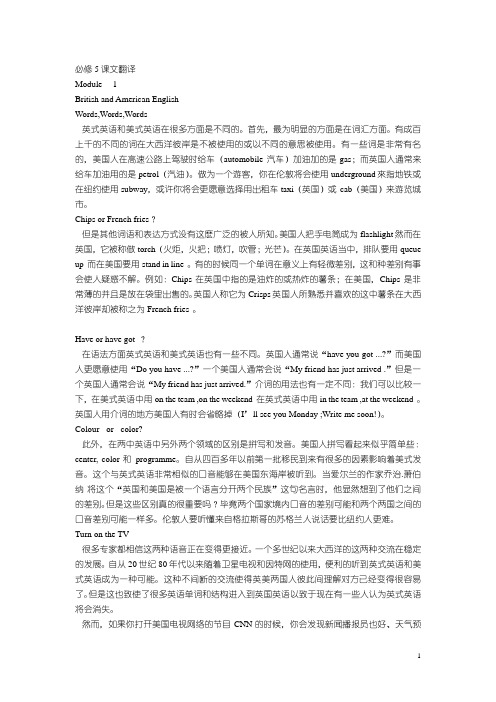
必修5课文翻译Module 1British and American EnglishWords,Words,Words英式英语和美式英语在很多方面是不同的。
首先,最为明显的方面是在词汇方面。
有成百上千的不同的词在大西洋彼岸是不被使用的或以不同的意思被使用。
有一些词是非常有名的,美国人在高速公路上驾驶时给车(automobile 汽车)加油加的是gas;而英国人通常来给车加油用的是petrol(汽油)。
做为一个游客,你在伦敦将会使用underground來指地铁或在纽约使用subway,或许你将会更愿意选择用出租车taxi(英国)或cab(美国)来游览城市。
Chips or French fries?但是其他词语和表达方式没有这麽广泛的被人所知。
美国人把手电筒成为flashlight然而在英国,它被称做torch(火炬,火把;喷灯,吹管;光芒)。
在英国英语当中,排队要用queue up 而在美国要用stand in line 。
有的时候同一个单词在意义上有轻微差别,这和种差别有事会使人疑惑不解。
例如:Chips 在英国中指的是油炸的或热炸的薯条;在美国,Chips 是非常薄的并且是放在袋里出售的。
英国人称它为Crisps英国人所熟悉并喜欢的这中薯条在大西洋彼岸却被称之为French fries 。
Have or have got ?在语法方面英式英语和美式英语也有一些不同。
英国人通常说“have you got ...?”而美国人更愿意使用“Do you have ...?”一个美国人通常会说“My friend has just arrived .”但是一个英国人通常会说“My friend has just arrived.”介词的用法也有一定不同:我们可以比较一下,在美式英语中用on the team ,on the weekend 在英式英语中用in the team ,at the weekend 。
外研版必修4 Module5 A Trip Along the Three Gorge Language points
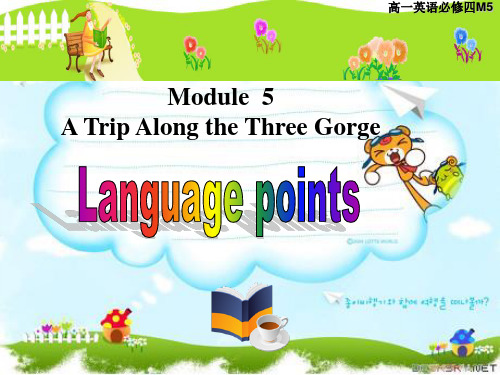
5. (课文原文) He and a colleague were to spend two years there teaching English at a teacher training college.他和一位同事将 要在那里的在一所教师培训学院呆两年,教授英语。
3. (课文原文) Cliffs are the steep sides of mountains at the edge of a river or the sea. at the edge of在……的边缘; on edge 紧张不安的
on the edge of at the edge of “在„„的边上”,指在物体的表面之 上;在……边上;快要…… 指“在„„的边缘”,并不特指在物体 的表面之上
on edge till she heard he was safe. 4. She was a bit________
4. (课文原文) A lake is an area of water surrounded by land.
On a hill 600 feet above the surrounding land, we watch the lines of rain move across the scene. 站在高出周围环境600英尺的小山丘上, 我们看到雨淅淅沥沥地下。 surround sb/sth with sb/sth使某人/某物被某人/某物包围 被……围绕着;周围是…… be surrounded by/with__________________________ surroundings n.环境(通常用复数形式) surrounding adj.周围的 _____________ 我喜欢周围都是树的房子。 surrounding I prefer a house with trees ____________ it. 成功关键在于尽量结交有创造性的人。 surrounded with/by The key to success lies in trying to keep _______________________ creative people.
高中英语Module5 A Trip Along the Three Gorges课件 外研版必修4
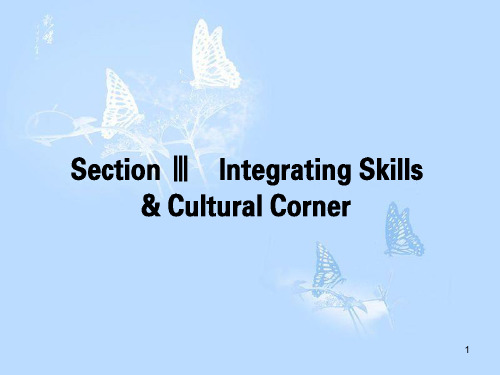
【易混辨析】
尤指从高处或窗边所看到的自然美景;此外还表示“视野;
view
见解”
表示景象,尤指奇观、壮观的景象。复数形式可表示名胜。
sight
此外,还表示“视力;视野;看见”
表示“景色”时,为可数名词。也指展现在眼前的情景、
scene
舞台上的场景。此外还表示“事发地点”
scenery
为不可数名词,指一个地区的总的自然风景
4
Ⅲ.完成句子 1.差不多一亿人住在此地,绝大多数住在东部。
Nearly 100 million people live here, __m_o_s_t_o_f__th_e_m__i_n_t_h_e__e_as.(t独
立主格结构) 2.只有找到了工作,我才有足够的钱去上学。
Only if I get a job _w_i_ll_I__h_a_v_e_e_n_o_u_g_h__m__o_n_e_y_t_o_g_o__t_o_s_c_h_o_o_l.(部
分倒装结构) 3.在旅游贸易中有一种说法,即所有的游客都会被敲竹杠。
There's a saying in the travel trade _th_a_t_a_l_l_t_o_u_ri_s_ts__a_re__r_ip_p_e_d_.off
(同位语从句)
5
4.无论到哪里,麦科克代尔先生都会带上妻子的照片、一支 蜡烛、一个手电筒、一件有隐秘口袋的上衣和一支用来写明信片的 钢笔。
8
*Oil painting is to be appreciated at a distance. 油画要在一定的距离外欣赏。 *At a distance of six miles you can't see much. 距离六英里以外的东西很难看清。 *I would keep my distance from that dog,if I were you! 我要是你,就离那条狗远一点!
(完整版)外研版高中英语必修4课文翻译
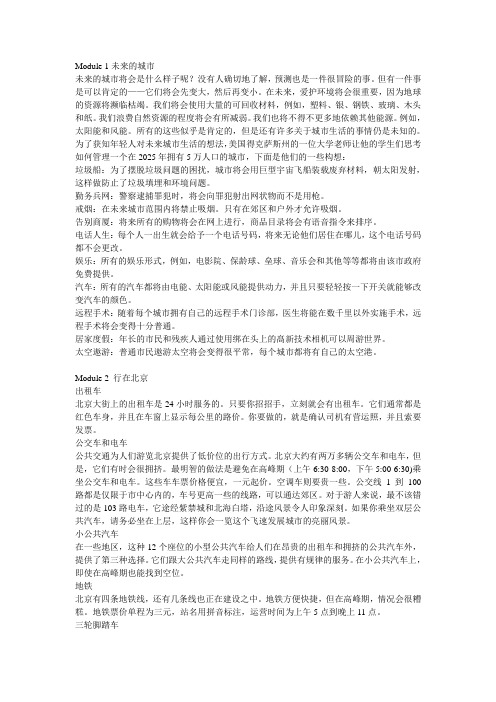
Module 1未来的城市未来的城市将会是什么样子呢?没有人确切地了解,预测也是一件很冒险的事。
但有一件事是可以肯定的——它们将会先变大,然后再变小。
在未来,爱护环境将会很重要,因为地球的资源将濒临枯竭。
我们将会使用大量的可回收材料,例如,塑料、银、钢铁、玻璃、木头和纸。
我们浪费自然资源的程度将会有所减弱。
我们也将不得不更多地依赖其他能源。
例如,太阳能和风能。
所有的这些似乎是肯定的,但是还有许多关于城市生活的事情仍是未知的。
为了获知年轻人对未来城市生活的想法,美国得克萨斯州的一位大学老师让他的学生们思考如何管理一个在2025年拥有5万人口的城市,下面是他们的一些构想:垃圾船:为了摆脱垃圾问题的困扰,城市将会用巨型宇宙飞船装载废弃材料,朝太阳发射,这样做防止了垃圾填埋和环境问题。
勤务兵网:警察逮捕罪犯时,将会向罪犯射出网状物而不是用枪。
戒烟:在未来城市范围内将禁止吸烟。
只有在郊区和户外才允许吸烟。
告别商厦:将来所有的购物将会在网上进行,商品目录将会有语音指令来排序。
电话人生:每个人一出生就会给予一个电话号码,将来无论他们居住在哪儿,这个电话号码都不会更改。
娱乐:所有的娱乐形式,例如,电影院、保龄球、垒球、音乐会和其他等等都将由该市政府免费提供。
汽车:所有的汽车都将由电能、太阳能或风能提供动力,并且只要轻轻按一下开关就能够改变汽车的颜色。
远程手术:随着每个城市拥有自己的远程手术门诊部,医生将能在数千里以外实施手术,远程手术将会变得十分普通。
居家度假:年长的市民和残疾人通过使用绑在头上的髙新技术相机可以周游世界。
太空遨游:普通市民遨游太空将会变得很平常,每个城市都将有自己的太空港。
Module 2 行在北京出租车北京大街上的出租车是24小时服务的。
只要你招招手,立刻就会有出租车。
它们通常都是红色车身,并且在车窗上显示每公里的路价。
你要做的,就是确认司机有营运照,并且索要发票。
公交车和电车公共交通为人们游览北京提供了低价位的出行方式。
【单词精讲】外研版高一英语必修4_Module5_narrow

narrow narrow • ·v. ['nærəʊ] ( narrows; narrowed; narrowing )
双解释义
• ·vt. & vi. (使)变窄 (cause to) become narrow
基本要点
1.narrow用作row可用作不及物动词,也可用作及物动词。用作及物 动词时接名词或代词作宾语。
补充资料
[同义词] adj. close, confined, illiberal, thin [反义词] adj. broad, liberal, wide [词源] <古英语nearu <古高地德语narwa <希腊语narnax(狭窄)
narrow narrow • ·adj. ['nærəʊ] ( narrower; narrowest )
词汇搭配
句型例句
用作定语 ▲~+n. She steered the car skillfully through the narrow streets.她熟练地驾驶着汽车穿过狭窄的街道。 The approach to the house is a narrow path.通向这所房屋的是一条很窄的小路。 The only access to the garden is by a narrow path at the side of the house.到花园去的唯一途径是走 房屋侧面的一条窄路。 They closed the dog in a narrow cave.他们把那只狗关在一个狭窄的洞穴里。 We had to force the pipe down a narrow hole to get it through.我们不得不使管道顺一个狭窄的洞 往下走以使之穿过。 We had to ram the pipe down a narrow hole.我们只好把管子沿一个窄洞塞下来。 It is supported on a narrow base.它由一个狭窄的底座支撑着。 The tug eased into the narrow docking space.拖船小心地驶入狭窄的码头停泊处。 The box won't wedge into such a narrow space.那盒子塞不进那么窄的地方。 When dams are new, they look like heaps of sticks sloping from a broad base to a narrow top.新坝刚 筑起时看上去像由底部宽大顶部窄小且又有一定斜度的树枝堆起来的。 His second book will appeal to a narrower audience, mainly teachers and college students.他的第二 本书的读者面将比较狭小,主要是教师和大学生。
Module4theDragonBoatFestivalwriting高中英语外研版必修五

Para.1 Para.2
Structure
Purpose Introduction date + origin
two activities
Para.3
Invitation
racing dragon boat eating zongzi
温馨提示:1:一般现在时 2:第一人称
There is no denying that there are a variety of festivals during a year in China. Among them the Spring Festival stands out. It represents unity and harmony(它象征着团结与和谐).Before the Spring Festival,people purchase as much food as possible, preparing for the family dinner on the New Year's Eve as well as the following days. 【备年货】Another tradition is to put up the couplet on each side of the door, expressing the best wishes.【贴春联】Of course,setting off firecrackers on the very night of the Eve and the next morning is also a must【放烟花】,which is the most important for people. As a rule, people are supposed to visit their friends and relatives, exchanging their greetings. [ 拜年 】 Meanwhile, they usually give lucky money to children. 【发压岁钱】
外研版高中英语必修四课文文本
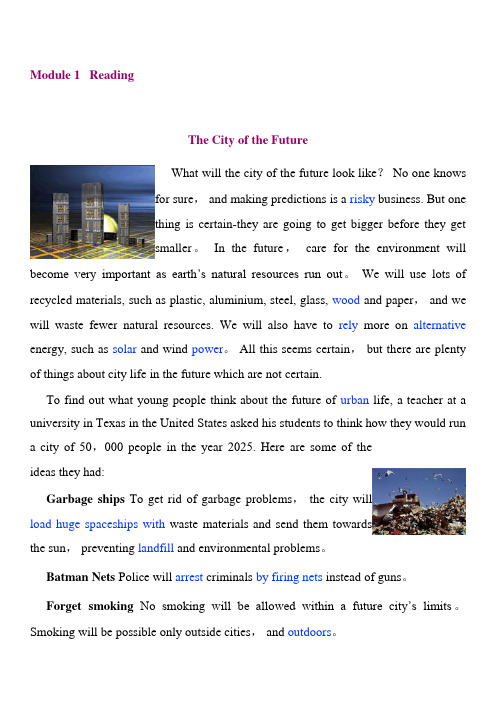
Module 1 ReadingThe City of the FutureWhat will the city of the future look like? No one knowsfor sure, and making predictions is a risky business. But onething is certain-they are going to get bigger before they getsmaller。
In the future,care for the environment will become very important as earth’s natural resources run out。
We will use lots of recycled materials, such as plastic, aluminium, steel, glass, wood and paper, and we will waste fewer natural resources. We will also have to rely more on alternative energy, such as solar and wind power。
All this seems certain, but there are plenty of things about city life in the future which are not certain.To find out what young people think about the future of urban life, a teacher at a university in Texas in the United States asked his students to think how they would run a city of 50,000 people in the year 2025. Here are some of theideas they had:Garbage ships To get rid of garbage problems, the city willload huge spaceships with waste materials and send them towardsthe sun, preventing landfill and environmental problems。
外研版高中英语必修四课文文本
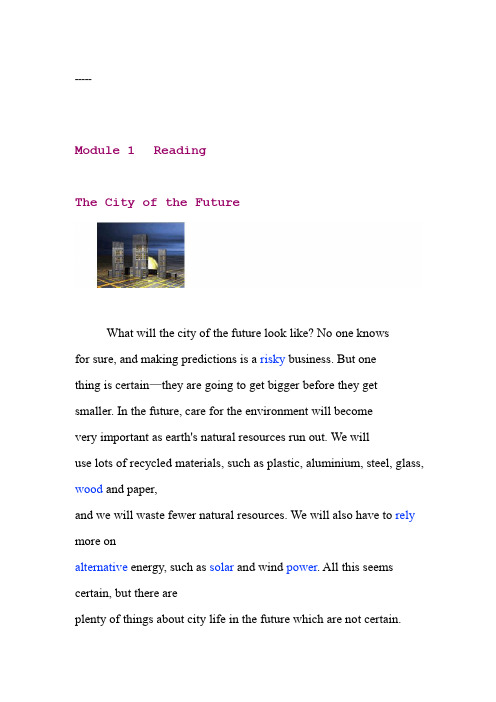
-----Module 1 ReadingThe City of the FutureWhat will the city of the future look like? No one knowsfor sure, and making predictions is a risky business. But onething is certain—they are going to get bigger before they get smaller. In the future, care for the environment will becomevery important as earth's natural resources run out. We willuse lots of recycled materials, such as plastic, aluminium, steel, glass, wood and paper,and we will waste fewer natural resources. We will also have to rely more onalternative energy, such as solar and wind power. All this seems certain, but there areplenty of things about city life in the future which are not certain.To find out what young people think about the future of urban life, a teacher at auniversity in Texas in the United States asked his students to think how they would runa city of 50,000 people in the year 2025. Here are some of the ideas they had:will the city rid of garbage problems, get Garbage ships To waste materials and send them towards load huge spaceships with and environmental problems.landfill the sun, preventinginstead of guns.criminals arrestby firing nets Batman Nets Police willNo smoking will be allowed within a future city's limits. Smoking Forget smoking.outdoors will be possible only outside cities, and, and catalogues will In the future all shopping will be done online Forget the malls to place orders.have voice commands-----------Telephones for life Everyone will be given a telephone number at birth that willnever change no matter where they live.Recreation All forms of recreation, such as cinemas, bowling, softball, concertsand others, will be provided free of charge by the city.Cars All cars will be powered by electricity, solar energy or wind, and it will bepossible to change the colour of cars at the flick of a switch. Telesurgery Distance surgery will become common as doctors carry out operationsfrom thousands of miles away, with each city having its own telesurgery outpatientclinic.Holidays at home Senior citizens and people with disabilities will be able to goanywhere in the world using high-tech cameras attached to their head.Space travel Travelling in space by ordinary citizens will be common. Each citywill have its own spaceport.Cultural CornerFamous Last WordsNot all predictions come true. Many of them are wrong, and some are verywrong. Here are just a few of the bad predictions people made in the twentiethcentury about the twenty-first century: AIRPLANESNo flying machine will ever fly from New York to Paris.Orville Wright, 1908.COMPUTERSI think there is a world market for maybe five computers.-----------Thomas Waston, chairman of IBM, 1943. CLOTHESThirty years from now people will be wearing clothes made of paper whichthey will be able to throw away after wearing them two or three times.Changing Times Magazine, 1957.MEN ON THE MOONWith the first moon colonies predicted for the 1970's, work is now inprogress on the types of building required for men to stay in when they're on themoon.Arnold B. Barach in The Changes to Come, 1962. THE BEATLESWe don't like their sound, and guitar music is on the way out.Decca Recording Co. rejecting the Beatles, 1962. ROBOTS IN THE HOUSEBy the year 2000, housewives will probably have a robot shaped like a boxwith one large eye on the top, several arms and hands, and long narrow pads onthe side for moving about.New York Times, 1966.KEYSBy the mid-1980's no one will ever need to hide a keyunder the doormat again, because there won't be anykeys.-----------Computer scientist Christopher Evans,The Micro Millennium, 1979.Module 2 ReadingGetting Around in BeijingTaxisTaxis are on the streets 24 hours a day. Simply raise your hand, and a taxi appears in no time. They are usually red, andthey display the price per kilometre on the window. Youshould check the cab has a business permit, and make sureyou ask for a receipt.Buses and trolleybusesPublic transport provides a cheap way to get around in Beijing. There are 20,000buses and trolleybuses in Beijing, but they can get very crowded. It's a good idea toavoid public transport during the rush hour (6:30 a.m.–8:00 a.m. and 5:00 p.m.–6:30p.m.). Fares are cheap, starting at 1 yuan. Air-conditioned buses cost more.Buses numbered 1 to 100 are limited to travel within the city centre. Highernumbers have destinations in the suburbs. Tourists shouldn't miss the 103 bus whichoffers one of the most impressive routes, past the Forbidden City and the WhitePagoda in Beihai Park. If you get on a double-decker bus, make sure you sit upstairs.You'll have a good view of the rapidly changing city.Most buses run from about 5:00 a.m. to midnight. However, there is also a nightbus service, provided by buses with a number in the 200s. Minibuses-----------Minibuses with seats for 12 passengers offer an alternative to expensive taxis andcrowded public transport in some areas. They run regular services and follow the sameroutes as large public buses. And in a minibus you always get a seat even in rush hours.UndergroundThere are four underground lines in Beijing, and several lines are underconstruction. Trains are fast and convenient, but rush hours can be terrible. A one-waytrip costs 3 yuan. Station names are marked in pinyin. The underground is open from5:00 a.m. to 11:00 p.m.PedicabsTourists like these human-pedalled ricycle taxis, but they can be expensive. Youshould talk to the driver, and make sure you know the price before you begin thejourney, for example, if it is per person, single or return. Tricycles are worth using ifyou want to explore the narrow alleys (hutong) of old Beijing.Cultural CornerThe London Congestion ChargeBeijing isn't the only city with traffic problems. You can get stuck in a traffic jamanywhere in the world. The worst problems occur in cities which are growing fast,such as Sao Paolo in Brazil and Lagos in Nigeria. But even cities in developedcountries such as the US suffer. Los Angeles, which was built with the motor car inmind, and is famous for its six-lane highways, is now theUSA's most congested city.In Europe most capital cities were planned and builtbefore cars, and city centre traffic jams have been part ofdaily life for a long time. The situation in central London,-----------where drivers spent fifty percent of their time in queues, became so bad that the localgovernment decided to do something about it. In February 2003 theMayor of London,敋?楌楶杮瑳湯?椠瑮潲畤散??捜湯敧瑳潩?档牡敧—a tax for cars entering the centreof the city.The idea is simple: every car coming into the centre has to pay £5 a day. Driverscan pay the charge at any of 10,000 pay points in the capital before 10 p.m. As the carscome into the centre, video cameras record their registration numbers, and these arechecked with a list of drivers who have paid the charge for that day. People who do notpay the charge will face a fine of £80.Most Londoners are not happy with the idea. They agree that London has a trafficproblem, but the congestion charge is expensive, and limits their freedom ...But does the congestion charge work? A survey carried out at the end of 2003suggests it does. After only six months, traffic coming into central London wasreduced by about 30 percent, and journey times by 15 percent. Morepeople usedpublic transport to get to work, and bicycles were suddenly very popular. What's more,central London shops did not lose business even though there were fewer cars.But there are a few people who think the charge should be much higher, forexample rich businessmen who work in the city centre and can easily afford it. Thiswould keep even more cars out of central London, and the roads would be nearlyempty. However, there are no plans to increase the charge.Module 3 ReadingGreetings Around the WorldIf you say the word communication, most people thinkof words and sentences. Although these are very important,-----------we communicate with more than just spoken and written words. Indeed, bodypositions are part of what we call ody language. We see examples of unconsciousbody language very often, yet there is also learned body language, which varies fromculture to culture.We use learned body language when we are introduced to strangers. Like otheranimals, we are on guard until we know it is safe to relax. So every culture hasdeveloped a formal way to greet strangers, to show them we are not aggressive.Traditionally, Europeans and Americans shake hands. They do this with the righthand—the strongest hand for most people. If our right hand is busy greeting someone,it cannot be holding a weapon. So the gesture is saying, I trust you. Look, I'm notcarrying a threatening weapon. If you shake hands with someone,you show you trustthem. We shake hands when we make a deal. It means, We agree and we trust eachother.Greetings in Asian countries do not involve touching the other person, but theyalways involve the hands. Traditionally in China, when we greet someone, we put theright hand over the left and bow slightly. Muslims give a salaam, where they touchtheir heart, mouth and forehead. Hindus join their hands and bow their heads in respect.In all of these examples, the hands are busy with the greeting and cannot hold aweapon.Even today, when some people have very informal styles of greeting, they still usetheir hands as a gesture of trust. American youths often greet each other with theexpression, Give me five! One person then holds up his hand, palm outwards andfive fingers spread. The other person raises his hand and slaps theother's open handabove the head in a high five. Nowadays, it is quite a common greeting.-----------Body language is fascinating for anyone to study. People give away much more bytheir gestures than by their words. Look at your friends and family and see if you are amind reader!Cultural CornerClappingWhy do we clap? To show we like something, of course. But we don't clap at theend of a television programme or a book, however good they are. We clap at the endof a live performance, such as a play, or a concert, to say thank you to the performers.First they give, and then we give. Without us—the audience—the performance wouldnot be complete.The custom of clapping has early beginnings. In classical Athens,applause meantjudgement and taking part. Plays were often in competition with each other, andprolonged clapping helped a play to win. The theatre was large—it could hold 14,000people, half the adult male population of the city, which meant that the audience couldmake a lot of noise.Applause was a sign of being part of the community, andof equality between actors and audience. The important thingwas to make the noise together, to add one's own smallhandclap to others. Clapping is social, like laughter: you don'tvery often clap or laugh out loud alone. It is like laughter in another way, too: it is infectious, and spreads very quickly. Clapping at concerts andtheatres is a universal habit. But some occasions on which people clap change fromone country to another. For example, in Britain people clap at awedding, but in Italythey sometimes clap at a funeral.-----------Module 4 ReadingThe Student Who Asked QuestionsIn a hungry world rice is a staple food and China is theworld's largest producer. Rice is also grown in many otherAsian countries, and in some European countries like Italy. Inthe rice-growing world, the Chinese scientist, Yuan Longping,is a leading figure.Yuan Longping was born and brought up in China. As a boy he was educated inmany schools and was given the nickname, he student who asks questions.From an early age he was interested in plants. He studied agriculture in college andas a young teacher he began experiments in crop breeding. Hethought that the key tofeeding people was to have more rice and to produce it more quickly. He thought therewas only one way to do this—by crossing different species of rice plant, and then hecould produce a new plant which could give a higher yield than either of the originalplants.First Yuan Longping experimented with different types of rice. The results of hisexperiments were published in China in 1966. Then he began his search for a specialtype of rice plant. It had to be male. It had to be sterile. Finally, in 1970 a naturallysterile male rice plant was discovered. This was the breakthrough. Researchers werebrought in from all over China to develop the new system. The research was supportedby the government.As a result of Yuan Longping's discoveries Chinese rice production rose by 47.5percent in the 1990's. There were other advantages too. 50 thousandsquare kilometresof rice fields were converted to growing vegetables and other cash crops. Following-----------this, Yuan Longping's rice was exported to other countries, such as Pakistan and thePhilippines.In Pakistan rice is the second most important crop after wheat and will be grown inmany parts of the country. The new hybrid rice has been developed by the YuanLongping Hightech Agricultural Company of China. Its yield is much greater than theyield of other types of rice grown in Pakistan.Cultural CornerRocketsToday rockets are very advanced machines which we can use to send astronautsinto space. They are also used in firework displays to celebrate great events, such asthe end of the Olympic Games or the beginning of the new millennium in the year2000.Rockets were probably invented by accident about 2,000 years ago. The Chinesehad a form of gunpowder which was put in bamboo tubes and thrown into fires tomake explosions during festivals. Perhaps some of the tubes jumped out of the fireinstead of exploding in it. The Chinese discovered that the gas escaping from the tubecould lift it into the air. The idea of the rocket was born.The first military use of rockets was in 1232. The Song Dynasty was at war withthe Mongols. During the battle of Kaifeng, the Song army shot arrows of flying fire.The tubes were attached to a long stick which helped keep the rocket moving in astraight direction. Soon the Mongols learned how to make rockets themselves and it ispossible that they introduced them to Europe. Between the 13th and 15th centuriesthere were many rocket experiments in England, France and Italy. They were used for-----------military purposes. One Italian scientist even invented a rocket which could travel overthe surface of water and hit an enemy ship.But not everybody wanted to use rockets in battles. Wan Hu, a Chinese governmentofficial, invented a flying chair. He attached two big kites to the chair, and 47 rocketsto the kites. The rockets were lit, there was a huge explosion and clouds of thicksmoke. When the smoke cleared Wan Hu and his chair had disappeared. No oneknows what happened. Did Wan Hu die in the explosion? Or was he carried miles intospace, becoming the world's first astronaut?Module 5 ReadingA Trip Along the Three GorgesIn August 1996, Peter Hessler, a young American teacher of English, arrived in thetwo years were to spendcolleague town of Fuling on the Yangtze River. He and athere teaching English at a teacher training college. They were the only foreigners inthe town. The first semester finished at the end of January and they had four weeks offfor the Spring Festival. They could go anywhere they wished. They decided to take a-----------boat downstream.You said, Our colleagues tickets for the Jiangyou boat. decided We to buyand goods shouldn't go on those ships. They are very crowded. They are mainly forpeople trading along the river. They don't stop at the temples and there won't be anyother foreigners. That sounded fine to me. We just had to show our passports and theylet us get on the boat.we brightly as sun was shining beautiful We left the docks on a afternoon. Theriver's the rafts along region. hilly Men rode bamboo through saileddownstream aedge and coal boats went past. As the sun set we docked at Fengdu. We could see thesun setting behind the white pagoda. It was beautiful.gorge The the Qutang Gorge. which through We slept the first gorge, is calledOh, mountains. the rushes the feet to narrows 350 as river through two-mile-highwell, my friend said, at least we have two more left.-----------At Wushan we made a detour up the Daning River to see some of the smallergorges. The next day we went through the big gorges on the Yangtze River. It was alovely morning as we went through the Wu Gorge. We passed the Xiang River, homeof Qu Yuan, the 3rd century BC poet. There was so much history along the YangtzeRiver. Every rock looked like a person or animal, every stream that joined the greatriver carried its legends, every hill was heavy with the past.As we came out of the third gorge, the Xiling Gorge, we sailed intotheconstruction site of the dam. All the passengers came on deck. We took pictures andpointed at the site, but we weren't allowed to get off the boat. The Chinese flag wasblowing in the wind. On a distant mountain was a sign in 20-foot characters. Buildthe Three Gorges Dam, Exploit the Yangtze River, it said.Cultural CornerPostcards to MyselfIn 50 years of travelling Colin McCorquodale has visited every country in the world, except three. And everywhere he goes, he sends himself a postcard. He always chooses a postcard with a beautiful view, and sticks on an interesting stamp. Usually he writes just a short message to himself. His latest one, from the Malvinas islands, reads Good fishing.On a wall in his home in London there is a large map ofthe world. There are hundreds of little red pins stuck in it. It's good to get a pin in themap, says Mr McCorquodale, ut I follow the rules. I'm allowed to stick one in onlyif I've been in a place for more than 24 hours. Naturally, Mr McCorquodale has hisfavourite places. New Zealand he describes as wonderful. In Europe, Italy is afavourite place. There's a saying in the travel trade that all tourists are ripped off.-----------Well, at least the Italians rip you off with a smile. Of China he says,This is onecountry in the world which is completely different. There's no European influence. It'sbeen around for 6,000 years, yet it's a country of the future.Wherever he goes, Mr McCorquodale takes with him aphoto of his wife, a candle, a torch, a shirt with a secretpocket, and a pen for writing his postcards.So why does he do it? For the postcards or the travel? Mr McCorquodale laughs. I do it for the journey, he says. Iget a kick out of travelling. And all the planning.Module 6 ReadingThe Monster of Lake TianchiThe Monster of Lake Tianchi in the Changbai Mountains in Jilin province,northeast China, is back in the news after several recent sightings. The director of alocal tourist office, Meng Fanying, said the monster, which seemed to be black incolour, was ten metres from the edge of the lake during the most recent sighting. Itjumped out of the water like a seal—about 200 people on Changbai's western peaksaw it, he said. Although no one really got a clear look at the mysterious creature,Xue Junlin, a local photographer, claimed that its head looked like ahorse.they claimsighting, a group of soldiers In another recentThe the water. the surface of moving saw an animal onlake, of side the walking soldiers, who were along theIt minutes. two for the watched creature swimming aboutwas greenish-black and had a round head with 10-centimetre horns, one of the soldiers said.-----------A third report came from Li Xiaohe, who was visiting the lake with his family. Heclaims to have seen a round black creature moving quickly through the water. Afterthree or four hundred metres it dived into the water. Ten minutes later the monsterappeared again and repeated the action. Mr Li Xiaohe said that he and his family wereable to see the monster clearly because the weather was fine and the lake was calm.There have been reports of monsters in Lake Tianchi since the beginning of the lastcentury, although no one has seen one close up. Some photos have been taken but theyare not clear because it was too far away. Many people think the monster may be adistant cousin of the Loch Ness monster in Scotland. They also think that there mightbe similar creatures in other lakes around the world. Scientists, however, are sceptical.They say that the low-temperature lake is unlikely to be able to support such largeliving creatures.Lake Tianchi is the highest volcanic lake in the world. It is 2,189 metres high andcovers an area of about ten square kilometres. In places it is more than 370 metresdeep.Cultural CornerThe Universal DragonDragons can be friendly or fierce, they can bring goodluck or cause death and destruction, but one thing is sure—people talk about them almost everywhere in the world. For acreature that doesn't actually exist, that's quite something.In Chinese culture, dragons are generous and wise, although they can beunpredictable. The dragon was closely connected to the royal family: the emperor'srobes have a symbol of a gold dragon with five claws. Other members of the royalfamily were allowed to wear dragon symbols, too, but with fewer claws and of a-----------different colour. According to popular belief, if you were born in the year of thedragon, you are intelligent, brave, and a natural leader.But in the west, dragons had a different reputation. The very first text in English,the Anglo-Saxon poem Beowulf, tells the story of a Scandinavianhero, Beowulf, whofights and kills a dangerous dragon but is himself killed in the fight. However, acrossthe border in Wales, the red dragon which appears on the Welsh flag is a positivesymbol, indicating strength and a sense of national identity.Why should the dragon have a different character indifferent parts of the world? Some experts believe it is due tothe animals the myths grew out of. In the west, the idea of the dragon probably came from the snake—an animal whichpeople hated and were afraid of.But in China, the idea of the dragon may have come from the alligator—a shyanimal which lives in rivers, but which is usually only seen when there is plenty ofwater—a good sign for agriculture. So the Chinese dragon was a bringer of goodfortune.------。
外研版高中英语必修四课文文本.pdf

Module 1 ReadingThe City of the FutureWhat will the city of the future look like? No one knowsfor sure, and making predictions is a risky business. But onething is certain—they are going to get bigger before they getsmaller. In the future, care for the environment will becomevery important as earth's natural resources run out. We will use lots of recycled materials, such as plastic, aluminium, steel, glass, wood and paper, and we will waste fewer natural resources. We will also have to rely more on alternative energy, such as solar and wind power. All this seems certain, but there are plenty of things about city life in the future which are not certain.To find out what young people think about the future of urban life, a teacher at a university in Texas in the United States asked his students to think how they would run a city of 50,000 people in the year 2025. Here are some of the ideas they had:Garbage ships To get rid of garbage problems, the city willload huge spaceships with waste materials and send them towardsthe sun, preventing landfill and environmental problems.Batman Nets Police will arrest criminals by firing nets instead of guns.Forget smoking No smoking will be allowed within a future city's limits. Smoking will be possible only outside cities, and outdoors.Forget the malls In the future all shopping will be done online, and catalogues will have voice commands to place orders.Telephones for life Everyone will be given a telephone number at birth that will never change no matter where they live.Recreation All forms of recreation, such as cinemas, bowling, softball, concerts and others, will be provided free of charge by the city.Cars All cars will be powered by electricity, solar energy or wind, and it will be possible to change the colour of cars at the flick of a switch.Telesurgery Distance surgery will become common as doctors carry out operations from thousands of miles away, with each city having its own telesurgery outpatient clinic.Holidays at home Senior citizens and people with disabilities will be able to go anywhere in the world using high-tech cameras attached to their head.Space travel Travelling in space by ordinary citizens will be common. Each city will have its own spaceport.Cultural CornerFamous Last WordsNot all predictions come true. Many of them are wrong, and some are very wrong. Here are just a few of the bad predictions people made in the twentieth century about the twenty-first century:AIRPLANES"No flying machine will ever fly from New York to Paris."Orville Wright, 1908. COMPUTERS"I think there is a world market for maybe five computers."Thomas Waston, chairman of IBM, 1943. CLOTHES"Thirty years from now people will be wearing clothes made of paper which they will be able to throw away after wearing them two or three times."Changing Times Magazine, 1957. MEN ON THE MOON"With the first moon colonies predicted for the 1970's, work is now in progress on the types of building required for men to stay in when they're on the moon."Arnold B. Barach in The Changes to Come, 1962. THE BEATLES"We don't like their sound, and guitar music is on the way out."Decca Recording Co. rejecting the Beatles, 1962. ROBOTS IN THE HOUSE"By the year 2000, housewives will probably have a robot shaped like a box with one large eye on the top, several arms and hands, and long narrow pads on the side for moving about."New York Times, 1966.KEYS"By the mid-1980's no one will ever need to hide a keyunder the doormat again, because there won't be anykeys."Computer scientist Christopher Evans,The Micro Millennium, 1979.Module 2 ReadingGetting Around in BeijingTaxisTaxis are on the streets 24 hours a day. Simply raise yourhand, and a taxi appears in no time. They are usually red, andthey display the price per kilometre on the window. Youshould check the cab has a business permit, and make sure you ask for a receipt.Buses and trolleybusesPublic transport provides a cheap way to get around in Beijing. There are 20,000 buses and trolleybuses in Beijing, but they can get very crowded. It's a good idea to avoid public transport during the rush hour (6:30 a.m.–8:00 a.m. and 5:00 p.m.–6:30 p.m.). Fares are cheap, starting at 1 yuan. Air-conditioned buses cost more.Buses numbered 1 to 100 are limited to travel within the city centre. Higher numbers have destinations in the suburbs. Tourists shouldn't miss the 103 bus which offers one of the most impressive routes, past the Forbidden City and the White Pagoda in Beihai Park. If you get on a double-decker bus, make sure you sit upstairs. You'll have a good view of the rapidly changing city.Most buses run from about 5:00 a.m. to midnight. However, there is also a night bus service, provided by buses with a number in the 200s.MinibusesMinibuses with seats for 12 passengers offer an alternative to expensive taxis and crowded public transport in some areas. They run regular services and follow the same routes as large public buses. And in a minibus you always get a seat even in rush hours. UndergroundThere are four underground lines in Beijing, and several lines are under construction. Trains are fast and convenient, but rush hours can be terrible. A one-way trip costs 3 yuan. Station names are marked in pinyin. The underground is open from 5:00 a.m. to 11:00 p.m.PedicabsTourists like these human-pedalled "tricycle taxis", but they can be expensive. You should talk to the driver, and make sure you know the price before you begin the journey, for example, if it is per person, single or return. Tricycles are worth using if you want to explore the narrow alleys (hutong) of old Beijing.Cultural CornerThe London Congestion ChargeBeijing isn't the only city with traffic problems. You can get stuck in a traffic jam anywhere in the world. The worst problems occur in cities which are growing fast, such as Sao Paolo in Brazil and Lagos in Nigeria. But even cities in developed countries such as the US suffer. Los Angeles, which was built with the motor car in mind, and is famous for its six-lane highways, is now theUSA's most congested city.In Europe most capital cities were planned and builtbefore cars, and city centre traffic jams have been part ofdaily life for a long time. The situation in central London,where drivers spent fifty percent of their time in queues, became so bad that the local government decided to do something about it. In February 2003 the Mayor of London, Ken Livingstone, introduced a "congestion charge"—a tax for cars entering the centre of the city.The idea is simple: every car coming into the centre has to pay £5 a day. Drivers can pay the charge at any of 10,000 pay points in the capital before 10 p.m. As the cars come into the centre, video cameras record their registration numbers, and these are checked with a list of drivers who have paid the charge for that day. People who do not pay the charge will face a fine of £80.Most Londoners are not happy with the idea. They agree that London has a traffic problem, but the congestion charge is expensive, and limits their freedom ...But does the congestion charge work? A survey carried out at the end of 2003 suggests it does. After only six months, traffic coming into central London was reduced by about 30 percent, and journey times by 15 percent. More people used public transport to get to work, and bicycles were suddenly very popular. What's more, central London shops did not lose business even though there were fewer cars.But there are a few people who think the charge should be much higher, for example rich businessmen who work in the city centre and can easily afford it. This would keep even more cars out of central London, and the roads would be nearly empty. However, there are no plans to increase the charge.Module 3 ReadingGreetings Around the WorldIf you say the word "communication", most people thinkof words and sentences. Although these are very important,we communicate with more than just spoken and writtenwords. Indeed, body positions are part of what we call "bodylanguage". We see examples of unconscious body languagevery often, yet there is also "learned" body language, whichvaries from culture to culture.We use "learned" body language when we are introduced to strangers. Like other animals, we are on guard until we know it is safe to relax. So every culture has developed a formal way to greet strangers, to show them we are not aggressive. Traditionally, Europeans and Americans shake hands. They do this with the right hand—the strongest hand for most people. If our right hand is busy greeting someone, it cannot be holding a weapon. So the gesture is saying, "I trust you. Look, I'm not carrying a threatening weapon." If you shake hands with someone, you show you trust them. We shake hands when we make a deal. It means, "We agree and we trust each other."Greetings in Asian countries do not involve touching the other person, but they always involve the hands. Traditionally in China, when we greet someone, we put the right hand over the left and bow slightly. Muslims give a "salaam", where they touch their heart, mouth and forehead. Hindus join their hands and bow their heads in respect. In all of these examples, the hands are busy with the greeting and cannot hold a weapon.Even today, when some people have very informal styles of greeting, they still use their hands as a gesture of trust. American youths often greet each other with the expression, "Give me five!" One person then holds up his hand, palm outwards and five fingers spread. The other person raises his hand and slaps the other's open hand above the head in a "high five". Nowadays, it is quite a common greeting.Body language is fascinating for anyone to study. People give away much more by their gestures than by their words. Look at your friends and family and see if you are a mind reader!Cultural CornerClappingWhy do we clap? To show we like something, of course. But we don't clap at the end of a television programme or a book, however good they are. We clap at the end of a live performance, such as a play, or a concert, to say thank you to the performers. First they give, and then we give. Without us—the audience—the performance would not be complete.The custom of clapping has early beginnings. In classical Athens, applause meant judgement and taking part. Plays were often in competition with each other, and prolonged clapping helped a play to win. The theatre was large—it could hold 14,000 people, half the adult male population of the city, which meant that the audience could make a lot of noise.Applause was a sign of being part of the community, andof equality between actors and audience. The important thingwas to make the noise together, to add one's own smallhandclap to others. Clapping is social, like laughter: you don'tvery often clap or laugh out loud alone. It is like laughter inanother way, too: it is infectious, and spreads very quickly. Clapping at concerts and theatres is a universal habit. But some occasions on which people clap change from one country to another. For example, in Britain people clap at a wedding, but in Italy they sometimes clap at a funeral.Module 4 ReadingThe Student Who Asked QuestionsIn a hungry world rice is a staple food and China is theworld's largest producer. Rice is also grown in many otherAsian countries, and in some European countries like Italy. Inthe rice-growing world, the Chinese scientist, Yuan Longping,is a leading figure.Yuan Longping was born and brought up in China. As a boy he was educated in many schools and was given the nickname, "the student who asks questions".From an early age he was interested in plants. He studied agriculture in college and as a young teacher he began experiments in crop breeding. He thought that the key to feeding people was to have more rice and to produce it more quickly. He thought there was only one way to do this—by crossing different species of rice plant, and then he could produce a new plant which could give a higher yield than either of the original plants.First Yuan Longping experimented with different types of rice. The results of his experiments were published in China in 1966. Then he began his search for a special type of rice plant. It had to be male. It had to be sterile. Finally, in 1970 a naturally sterile male rice plant was discovered. This was the breakthrough. Researchers were brought in from all over China to develop the new system. The research was supported by the government.As a result of Yuan Longping's discoveries Chinese rice production rose by 47.5 percent in the 1990's. There were other advantages too. 50 thousand square kilometres of rice fields were converted to growing vegetables and other cash crops. Following this, Yuan Longping's rice was exported to other countries, such as Pakistan and the Philippines.In Pakistan rice is the second most important crop after wheat and will be grown in many parts of the country. The new hybrid rice has been developed by the Yuan Longping Hightech Agricultural Company of China. Its yield is much greater than the yield of other types of rice grown in Pakistan.Cultural CornerRocketsToday rockets are very advanced machines which we can use to send astronauts into space. They are also used in firework displays to celebrate great events, such as the end of the Olympic Games or the beginning of the new millennium in the year 2000.Rockets were probably invented by accident about 2,000 years ago. The Chinese had a form of gunpowder which was put in bamboo tubes and thrown into fires to make explosions during festivals. Perhaps some of the tubes jumped out of the fire instead of exploding in it. The Chinese discovered that the gas escaping from the tube could lift it into the air. The idea of the rocket was born.The first military use of rockets was in 1232. The Song Dynasty was at war with the Mongols. During the battle of Kaifeng, the Song army shot "arrows of flying fire". The tubes were attached to a long stick which helped keep the rocket moving in a straight direction. Soon the Mongols learned how to make rockets themselves and it is possible that they introduced them to Europe. Between the 13th and 15th centuries there were many rocket experiments in England, France and Italy. They were used for military purposes. One Italian scientist even invented a rocket which could travel over the surface of water and hit an enemy ship.But not everybody wanted to use rockets in battles. Wan Hu, a Chinese government official, invented a flying chair. He attached two big kites to the chair, and 47 rockets to the kites. The rockets were lit, there was a huge explosion and clouds of thick smoke. When the smoke cleared Wan Hu and his chair had disappeared. No one knows what happened. Did Wan Hu die in the explosion? Or was he carried miles into space, becoming the world's first astronaut?Module 5 ReadingA Trip Along the Three GorgesIn August 1996, Peter Hessler, a young American teacher of English, arrived in the town of Fuling on the Yangtze River. He and a colleague were to spend two years there teaching English at a teacher training college. They were the only foreigners in the town. The first semester finished at the end of January and they had four weeks off for the Spring Festival. They could go anywhere they wished. They decided to take a boat downstream.We decided to buy tickets for the Jiangyou boat. Our colleagues said, "You shouldn't go on those ships. They are very crowded. They are mainly for goods andpeople trading along the river. They don't stop at the temples and there won't be any other foreigners." That sounded fine to me. We just had to show our passports and they let us get on the boat.We left the docks on a beautiful afternoon. The sun was shining brightly as we sailed downstream through a hilly region. Men rode bamboo rafts along the river's edge and coal boats went past. As the sun set we docked at Fengdu. We could see the sun setting behind the white pagoda. It was beautiful.We slept through the first gorge, which is called the Qutang Gorge. The gorge narrows to 350 feet as the river rushes through the two-mile-high mountains. "Oh, well," my friend said, "at least we have two more left."At Wushan we made a detour up the Daning River to see some of the smaller gorges. The next day we went through the big gorges on the Yangtze River. It was a lovely morning as we went through the Wu Gorge. We passed the Xiang River, home of Qu Yuan, the 3rd century BC poet. There was so much history along the Yangtze River. Every rock looked like a person or animal, every stream that joined the great river carried its legends, every hill was heavy with the past.As we came out of the third gorge, the Xiling Gorge, we sailed into the construction site of the dam. All the passengers came on deck. We took pictures and pointed at the site, but we weren't allowed to get off the boat. The Chinese flag was blowing in the wind. On a distant mountain was a sign in 20-foot characters. "Build the Three Gorges Dam, Exploit the Yangtze River," it said.Cultural CornerPostcards to MyselfIn 50 years of travelling Colin McCorquodale has visitedevery country in the world, except three. And everywhere hegoes, he sends himself a postcard. He always chooses a postcard with a beautiful view, and sticks on an interesting stamp. Usually he writes just a short message to himself. His latest one, from the Malvinas islands, reads Good fishing.On a wall in his home in London there is a large map of the world. There are hundreds of little red pins stuck in it. "It's good to get a pin in the map," says Mr McCorquodale, "but I follow the rules. I'm allowed to stick one in only if I've been in a place for more than 24 hours." Naturally, Mr McCorquodale has his favourite places. New Zealand he describes as "wonderful". In Europe, Italy is a favourite place. "There's a saying in the travel trade that all tourists are ripped off. Well, at least the Italians rip you off with a smile." Of China he says,"This is one country in the world which is completely different. There's no European influence. It's been around for 6,000 years, yet it's a country of the future."Wherever he goes, Mr McCorquodale takes with him aphoto of his wife, a candle, a torch, a shirt with a secretpocket, and a pen for writing his postcards.So why does he do it? For the postcards or the travel? MrMcCorquodale laughs. "I do it for the journey," he says. "Iget a kick out of travelling. And all the planning."Module 6 ReadingThe Monster of Lake TianchiThe "Monster of Lake Tianchi" in the Changbai Mountains in Jilin province, northeast China, is back in the news after several recent sightings. The director of a local tourist office, Meng Fanying, said the monster, which seemed to be black in colour, was ten metres from the edge of the lake during the most recent sighting. "It jumped out of the water like a seal—about 200 people on Changbai's western peaksaw it," he said. Although no one really got a clear look at the mysterious creature, Xue Junlin, a local photographer, claimed that its headlooked like a horse.In another recent sighting, a group of soldiers claim theysaw an animal moving on the surface of the water. Thesoldiers, who were walking along the side of the lake,watched the creature swimming for about two minutes. "Itwas greenish-black and had a round head with 10-centimetre horns", one of the soldiers said.A third report came from Li Xiaohe, who was visiting the lake with his family. He claims to have seen a round black creature moving quickly through the water. After three or four hundred metres it dived into the water. Ten minutes later the monster appeared again and repeated the action. Mr Li Xiaohe said that he and his family were able to see the monster clearly because the weather was fine and the lake was calm.There have been reports of monsters in Lake Tianchi since the beginning of the last century, although no one has seen one close up. Some photos have been taken but they are not clear because it was too far away. Many people think the monster may be a distant cousin of the Loch Ness monster in Scotland. They also think that there might be similar creatures in other lakes around the world. Scientists, however, are sceptical. They say that the low-temperature lake is unlikely to be able to support such large living creatures.Lake Tianchi is the highest volcanic lake in the world. It is 2,189 metres high and covers an area of about ten square kilometres. In places it is more than 370 metres deep.Cultural CornerThe Universal DragonDragons can be friendly or fierce, they can bring goodluck or cause death and destruction, but one thing is sure—people talk about them almost everywhere in the world. For acreature that doesn't actually exist, that's quite something.In Chinese culture, dragons are generous and wise, although they can be unpredictable. The dragon was closely connected to the royal family: the emperor's robes have a symbol of a gold dragon with five claws. Other members of the royal family were allowed to wear dragon symbols, too, but with fewer claws and of a different colour. According to popular belief, if you were born in the year of the dragon, you are intelligent, brave, and a natural leader.But in the west, dragons had a different reputation. The very first text in English, the Anglo-Saxon poem Beowulf, tells the story of a Scandinavian hero, Beowulf, who fights and kills a dangerous dragon but is himself killed in the fight. However, across the border in Wales, the red dragon which appears on the Welsh flag is a positive symbol, indicating strength and a sense of national identity.Why should the dragon have a different character indifferent parts of the world? Some experts believe it is due tothe animals the myths grew out of. In the west, the idea of thedragon probably came from the snake—an animal which people hated and were afraid of.But in China, the idea of the dragon may have come from the alligator—a shy animal which lives in rivers, but which is usually only seen when there is plenty of water—a good sign for agriculture. So the Chinese dragon was a bringer of good fortune.。
外研版高中英语必修4课文翻译
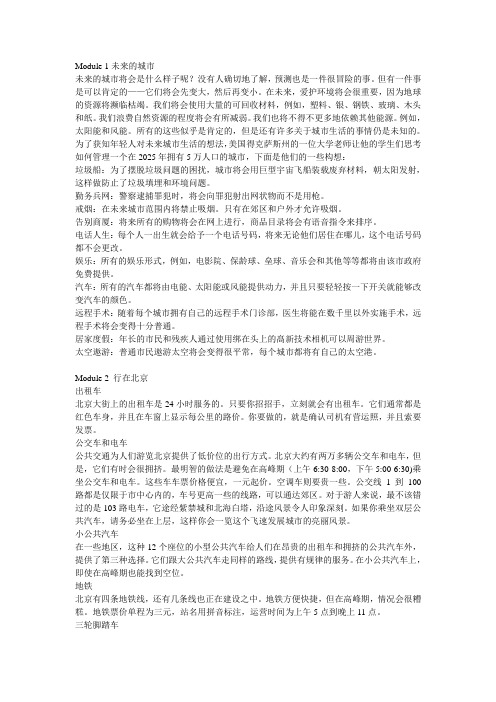
Module 1未来的城市未来的城市将会是什么样子呢?没有人确切地了解,预测也是一件很冒险的事。
但有一件事是可以肯定的——它们将会先变大,然后再变小。
在未来,爱护环境将会很重要,因为地球的资源将濒临枯竭。
我们将会使用大量的可回收材料,例如,塑料、银、钢铁、玻璃、木头和纸。
我们浪费自然资源的程度将会有所减弱。
我们也将不得不更多地依赖其他能源。
例如,太阳能和风能。
所有的这些似乎是肯定的,但是还有许多关于城市生活的事情仍是未知的。
为了获知年轻人对未来城市生活的想法,美国得克萨斯州的一位大学老师让他的学生们思考如何管理一个在2025年拥有5万人口的城市,下面是他们的一些构想:垃圾船:为了摆脱垃圾问题的困扰,城市将会用巨型宇宙飞船装载废弃材料,朝太阳发射,这样做防止了垃圾填埋和环境问题。
勤务兵网:警察逮捕罪犯时,将会向罪犯射出网状物而不是用枪。
戒烟:在未来城市范围内将禁止吸烟。
只有在郊区和户外才允许吸烟。
告别商厦:将来所有的购物将会在网上进行,商品目录将会有语音指令来排序。
电话人生:每个人一出生就会给予一个电话号码,将来无论他们居住在哪儿,这个电话号码都不会更改。
娱乐:所有的娱乐形式,例如,电影院、保龄球、垒球、音乐会和其他等等都将由该市政府免费提供。
汽车:所有的汽车都将由电能、太阳能或风能提供动力,并且只要轻轻按一下开关就能够改变汽车的颜色。
远程手术:随着每个城市拥有自己的远程手术门诊部,医生将能在数千里以外实施手术,远程手术将会变得十分普通。
居家度假:年长的市民和残疾人通过使用绑在头上的髙新技术相机可以周游世界。
太空遨游:普通市民遨游太空将会变得很平常,每个城市都将有自己的太空港。
Module 2 行在北京出租车北京大街上的出租车是24小时服务的。
只要你招招手,立刻就会有出租车。
它们通常都是红色车身,并且在车窗上显示每公里的路价。
你要做的,就是确认司机有营运照,并且索要发票。
公交车和电车公共交通为人们游览北京提供了低价位的出行方式。
- 1、下载文档前请自行甄别文档内容的完整性,平台不提供额外的编辑、内容补充、找答案等附加服务。
- 2、"仅部分预览"的文档,不可在线预览部分如存在完整性等问题,可反馈申请退款(可完整预览的文档不适用该条件!)。
- 3、如文档侵犯您的权益,请联系客服反馈,我们会尽快为您处理(人工客服工作时间:9:00-18:30)。
高中英语课本必修四重点课文英汉对照高效辅导
—————————————————————————————————————————————————————————————————————————
Module 5 A Trip Along the Three Gorges 三峡之旅
In August 1996, Peter Hessler, a young American teacher of English, arrived in the town of Fuling on the Yangtze River.
He and a colleague were to spend two years there teaching English at a teacher training college.
They were the only foreigners in the town. The first semester finished at the end of January and they had four weeks off f or the Spring Festival.
They could go anywhere they wished. They decided to take a boat downstream.
We decided to buy tickets for the Jiangyou boat.
Our colleagues said, “You shouldn’t go on those ships. They are very crowded. They are mainly for goods and people trading along the river.
They don’t stop at the temples and there won’t be any other foreigners.” That sounded fine to me.
We just had to show our passports and they let us get on the boat.
We left the docks on a beautiful afternoon. The sun was shining brightly as we sailed downstream through a hilly region.
Men rode bamboo rafts along the river’s edge and coal boats went past.。
As the sun set we docked at Fengdu. We could see the sun setting behind the white pagoda. It was beautiful.
We slept through the first gorge, which is called the Qutang Gorge.
The gorge narrows to 350 feet as the river rushes through the tow-mile-high mountains.
“Oh, well,” my friend said, “at least we have two more left.”
At Wushan we made a detour up the Daning River to see some of the smaller gorges.
The next day we went through the ig gorges on the Yangtze River. It was a lovely morning as we went through the Wu Gorge.
We passed the Xiang River, home of Qu Yuan, the 3rd century BC poet. There was so much history long the Yangtze River.
Every rock looked like a person or animal, every stream that joined the great river carried its legends, every hill was heavy with the past.
As we came out of the third gorge, the Xiling Gorge, we sailed into the construction site of the dam.
All the passengers came on deck. We took pictures and pointed at the site, but we weren’t allowed to get off the boat.
The Chinese flag was blowing in the wind. On a distant mountain was a sign in 20-foot characters. “Build the Three Gorges Dam, Exploit the Yangtze River,” it said.。
